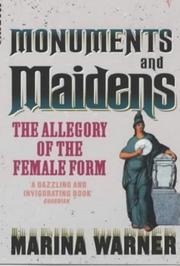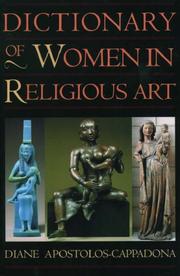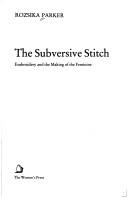| Listing 1 - 10 of 298 | << page >> |
Sort by
|
Book
Year: 1973 Publisher: New York: Abner Schram,
Abstract | Keywords | Export | Availability | Bookmark
 Loading...
Loading...Choose an application
- Reference Manager
- EndNote
- RefWorks (Direct export to RefWorks)
Women --- Women in art

ISBN: 0099588811 9780099588818 Year: 1996 Publisher: London Vintage
Abstract | Keywords | Export | Availability | Bookmark
 Loading...
Loading...Choose an application
- Reference Manager
- EndNote
- RefWorks (Direct export to RefWorks)
Women in art --- History
Book
Abstract | Keywords | Export | Availability | Bookmark
 Loading...
Loading...Choose an application
- Reference Manager
- EndNote
- RefWorks (Direct export to RefWorks)
Book
Year: 1973 Publisher: New York : Copyright 1972 A. Schram ; distributed by Universe Books,
Abstract | Keywords | Export | Availability | Bookmark
 Loading...
Loading...Choose an application
- Reference Manager
- EndNote
- RefWorks (Direct export to RefWorks)
Women --- Women in Art. --- History
Book
ISBN: 185332034X Year: 1989 Publisher: London : South Bank Centre,
Abstract | Keywords | Export | Availability | Bookmark
 Loading...
Loading...Choose an application
- Reference Manager
- EndNote
- RefWorks (Direct export to RefWorks)
Book
ISBN: 9783631600603 3631600607 Year: 2010 Publisher: Frankfurt am Main: Peter Lang,
Abstract | Keywords | Export | Availability | Bookmark
 Loading...
Loading...Choose an application
- Reference Manager
- EndNote
- RefWorks (Direct export to RefWorks)

ISBN: 0195120981 Year: 1998 Publisher: Oxford Oxford university press
Abstract | Keywords | Export | Availability | Bookmark
 Loading...
Loading...Choose an application
- Reference Manager
- EndNote
- RefWorks (Direct export to RefWorks)

ISBN: 0704338831 Year: 1984 Publisher: London Women's press
Abstract | Keywords | Export | Availability | Bookmark
 Loading...
Loading...Choose an application
- Reference Manager
- EndNote
- RefWorks (Direct export to RefWorks)
Embroidery --- Femininity --- Women in art --- History
Book
ISBN: 9781631890239 9781631890246 Year: 2016 Publisher: San Diego Cognella
Abstract | Keywords | Export | Availability | Bookmark
 Loading...
Loading...Choose an application
- Reference Manager
- EndNote
- RefWorks (Direct export to RefWorks)
Book
ISBN: 9780231215268 Year: 2024 Publisher: New York Columbia University Press
Abstract | Keywords | Export | Availability | Bookmark
 Loading...
Loading...Choose an application
- Reference Manager
- EndNote
- RefWorks (Direct export to RefWorks)
"Opening with the re-working of an opera she wrote entitled Lady Loathly as a kind of parable for feminist criticism, the author of The Scandal of Pleasure and Venus in Exile here re-evaluates both the tropes of female desire, rape, beauty, and art and their aesthetic expressions in light of the #MeToo movement. She shows why and how #MeToo changed the way she does her work. Steiner played a large part in defining the field of aesthetic theory as it relates to women and sexuality. Her new book is a hybrid of art as criticism and criticism as art. It is highly personal and self-reflective, and includes surprising new interpretations of many canonical artists. She discusses the work of Barbara MacCallum and her husband-model. She also writes about Marlene Dumas, a South African artist living in Amsterdam whose work demonstrates what modernism meant for the treatment of the female nude, and Kristin Beeler, who addresses bodies permanently changed by illness or injury in her project Rag and Bone. Steiner devotes a chapter to Picasso and his models--she and others had previously glossed over the pain of his models. There is also an important chapter on the "rape memorial" in Kosovo, in honor of Kosovar Albanians raped during the war. Steiner is inspired by Sei Shonagon and her Pillow Book and the Wife of Bath, both of whom exceeded their contexts, she says. They and other female figures Steiner describes, demonstrate the interconnection of taste, beauty, and freedom in women's lives. At the end of the book Steiner says that we should own our liberalism and defend it. This is ultimately the message all beauty holds. Women throughout time and culture, who strove for sexual autonomy, bequeathed a legacy of beauty to us all. As James Young's review points out, Steiner's fitting summation at the end of the introduction states, "Through our taste, pleasure, and desire we not only know ourselves but affect the world as women. I like, therefore we are.""--
| Listing 1 - 10 of 298 | << page >> |
Sort by
|

 Search
Search Feedback
Feedback About UniCat
About UniCat  Help
Help News
News